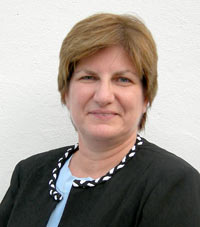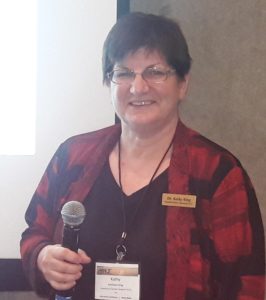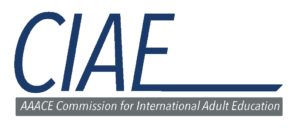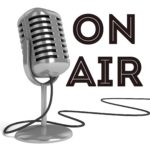Article published in Inside Fordham 9/1//2006
By Peter Catapano
“Theory is wonderful, but if it remains by itself it becomes stale. It gathers its lifeblood in research and practice.” — Kathleen King
If back in the day, say 1995, you were unreasonably distraught when you were forced to trade your Smith Corona for Microsoft Word, or maybe pulled your hair out trying to figure out how to use e-mail, you probably could have used the advice and support of Kathleen P. King, Ed.D., professor of education at Fordham University.
As former director of the University’s Regional Educational Technology Center for Professional  Development (RETC), and recent director of the Graduate School of Education’s program of Adult Education and Human Resource Development, King has made it her mission to help educators cope with rapid change, technological and otherwise. Her core work, founded in the principles of a theory called “transformative learning,” of which she is a major proponent, seeks to turn challenges—or “disorienting dilemmas”—into opportunities for both learning and personal growth. Transformative learning, as King puts it, “describes how people react when they come across difficult points in their life, how they cope and what they learn from it.”
Development (RETC), and recent director of the Graduate School of Education’s program of Adult Education and Human Resource Development, King has made it her mission to help educators cope with rapid change, technological and otherwise. Her core work, founded in the principles of a theory called “transformative learning,” of which she is a major proponent, seeks to turn challenges—or “disorienting dilemmas”—into opportunities for both learning and personal growth. Transformative learning, as King puts it, “describes how people react when they come across difficult points in their life, how they cope and what they learn from it.”
And, as she is quick to emphasize, “Teachers are learners, too.”
King’s approach to adult education takes in several disciplines, most notably technology. She is a techie by nature, well versed in computing and at ease with the general onslaught of technological innovations that have changed the way we live and work in the past 15 years. The resources available at RETC reflect that: podcasts for teachers, computing testing and certification, online education, and a host of other resources devoted to helping teachers and other adults to innovate, teach, and learn. It is a source of knowledge she believes educators sorely need.
As an educator, King said, “technology will throw you into these conflicts,” posing challenges, and sometimes crises. “In the ‘70s,” she says, learning about new technologies was, “a nice thing to do. Today, it’s survival.”
King has a book out this year, Harnessing Innovative Technology in Higher Education: Access, Equity, Policy, and Instruction (Atwood, 2006), edited with Joan K. Griggs. In its conclusion, written with Susan Biro, Ed.D., associate director of RETC, King says, “In the process, we learn that the pathway [to integrating technology into higher education] is not linear, and that as we are learning about technology along the way, we are also learning about our learners, our organizations, and ourselves.” An insight that might have been gleaned from King’s own non-linear career.
There is a spiritual component to King’s work. Before she began her academic life in the early 1990s, King served as a nondenominational missionary in New England. In her research, she is keen to draw lessons from the religious and ethical traditions of many cultures. A recent article she authored looks at transformative learning from the viewpoint of Confucianism.
Her record of accomplishment since she came to Fordham in 1997 is sort of disorienting itself: she has secured, and now oversees, more than 20 grants, several million dollars worth, for the University; she has received several awards for her work in the field; she has authored dozen of articles for journals; and edited, contributed or authored dozens of books, many on technology and learning. Her latest, written with Victor Wang, Ed.D., California State University, Long Beach, Comparative Adult Education Around the Globe, includes observations of educators from Asia and the Middle East, and will be published in both Germany and China in a few weeks.
The idea of transformative learning, she said, “has been dominated by Western interpretation. We need to open it up to our colleagues around the world.”
King—who has a bachelor’s degree in biochemistry, a master’s in theology, and a master’s and doctorate in education—sees adult education as a perfect fit for someone like herself, naturally drawn to and inspired by a number of different ideas and disciplines. “The theme running through all these interests,” she said, “is how adults learn and change their lives.”
She also believes she ended up at the right university to undertake this work. “Fordham is a very good fit for me. They value theory and research, but also put great value on people and practice.”
Though King’s unconventional ideas have often forced her to take a radical stand with her colleagues, she remains committed to the idea of helping others learn and change for the better.
“I am not to here to promote my political view,” King said. “We are trying to provide a platform where people can step forward into their voice. Transformative learning is about opening up opportunities.”
 =
=




 Development (RETC), and recent director of the Graduate School of Education’s program of Adult Education and Human Resource Development, King has made it her mission to help educators cope with rapid change, technological and otherwise. Her core work, founded in the principles of a theory called “transformative learning,” of which she is a major proponent, seeks to turn challenges—or “disorienting dilemmas”—into opportunities for both learning and personal growth. Transformative learning, as King puts it, “describes how people react when they come across difficult points in their life, how they cope and what they learn from it.”
Development (RETC), and recent director of the Graduate School of Education’s program of Adult Education and Human Resource Development, King has made it her mission to help educators cope with rapid change, technological and otherwise. Her core work, founded in the principles of a theory called “transformative learning,” of which she is a major proponent, seeks to turn challenges—or “disorienting dilemmas”—into opportunities for both learning and personal growth. Transformative learning, as King puts it, “describes how people react when they come across difficult points in their life, how they cope and what they learn from it.” =
=